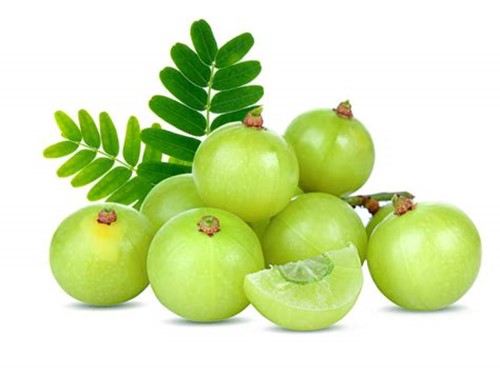
Scientific Name: Phyllanthus Emblica
Higher Classification: Leafflower
Family Name: Phyllanthaceae
Rank Name: Species
Order Name: Malpighiales
Kingdom: Plantae
Amalaki
Published Date: 6/17/2023 5:53:38 AM
What is Amalaki :
Amalaki also called Amla or, Indian Gooseberry, is a fruit of a large deciduous tree that is rich in vitamin C (ascorbic acid), and hence builds immunity, enhances metabolism and digestion, promotes clear skin, thickens hair growth, and improves eyesight. It also helps with the common cold, heart health, cholesterol problems, diabetes, and may even prevent cancer.
Amla is native to India, also growing in Sri Lanka, South East Asia, Uzbekistan, China nowadays. (More Details)
Availability:
It can be consumed in the form of juice, powder, chutneys, or pickles. It can be eaten raw as a whole fruit also.
What are its benefits:
- The antioxidants and vitamins found in amla berries offer several health benefits. High concentrations of vitamin C in amla helps the body recover from illness. Amla berries also include several flavonols, chemicals that have been linked to benefits like improved memory.
- Diabetes Control: The soluble fiber in amla berries dissolves quickly in the body, which helps to slow the rate your body absorbs sugar. This can help reduce blood sugar spikes. Amla berries also have a positive effect on blood glucose and lipid counts in people with type 2 diabetes.
- Better Digestion: The fiber in amla berries helps the body regulate bowel movements and may help to relieve symptoms from conditions like irritable bowel syndrome. High levels of vitamin C in Amla berries help your body absorb other nutrients, so they may be helpful if you take iron and other mineral supplements.
- Healthier Eyes: Amla berries are rich in vitamin A, which is key to improving eye health. Vitamin A not only improves vision but also may lower the risk of age-related macular degeneration. Amla's vitamin C content aids in eye health by fighting bacteria, which can help to protect your eyes from conjunctivitis (pink eye) and other infections.
- Immunity: One 100g serving of amla berries (about a half cup) provides 300mg of vitamin C—more than twice the daily recommended value for adults. You'll also find notable amounts of polyphenols, alkaloids, and flavonoids. Amla has antibacterial and anti-inflammatory properties.
- Memory and Brain Health: The phytonutrients and antioxidants in amla can benefit memory by fighting against free radicals that can attack and damage brain cells. Amla's high concentration of Vitamin C helps your body produce norepinephrine, a neurotransmitter believed to improve brain function in people with dementia. It is used to improve voice, sore throat, and various disorders related to the throat.
- It is very effective in various bleeding disorders.
Ayurvedic Properties:
- Rasa (taste): Amla has five tastes (sour, sweet, astringent, bitter, and pungent).
- Vipaka (Taste after digestion): Sweet (Madhura)
- Veerya (Potency): Cold (Sheeta)
- Effect on tridoshas (energies): Tridoshahara - Balances all three doshas. Due to its sour taste is used to pacify Vata dosha. Its sweet taste and cool effects help to pacify Pitta dosha. Because of its dry nature and astringent taste, it pacifies the increased Kapha doshas in the body. Hence this herb used to make the equilibrium of three doshas (energies) in various disorders in the body.
- It also increases the sperm count and acts as a Rasayana (rejuvenates the body and best anti-aging herb).
Regional Names:
- Hindi: Amla; Marathi: Banares Avala; Bengali: Amla; Gujarati: Amali; Kannada: Amalaka; Malayalam: Nelli; Punjabi: Ambli; Sanskrit: Adiphala; Tamil: Amalagam; Telugu: Anwala